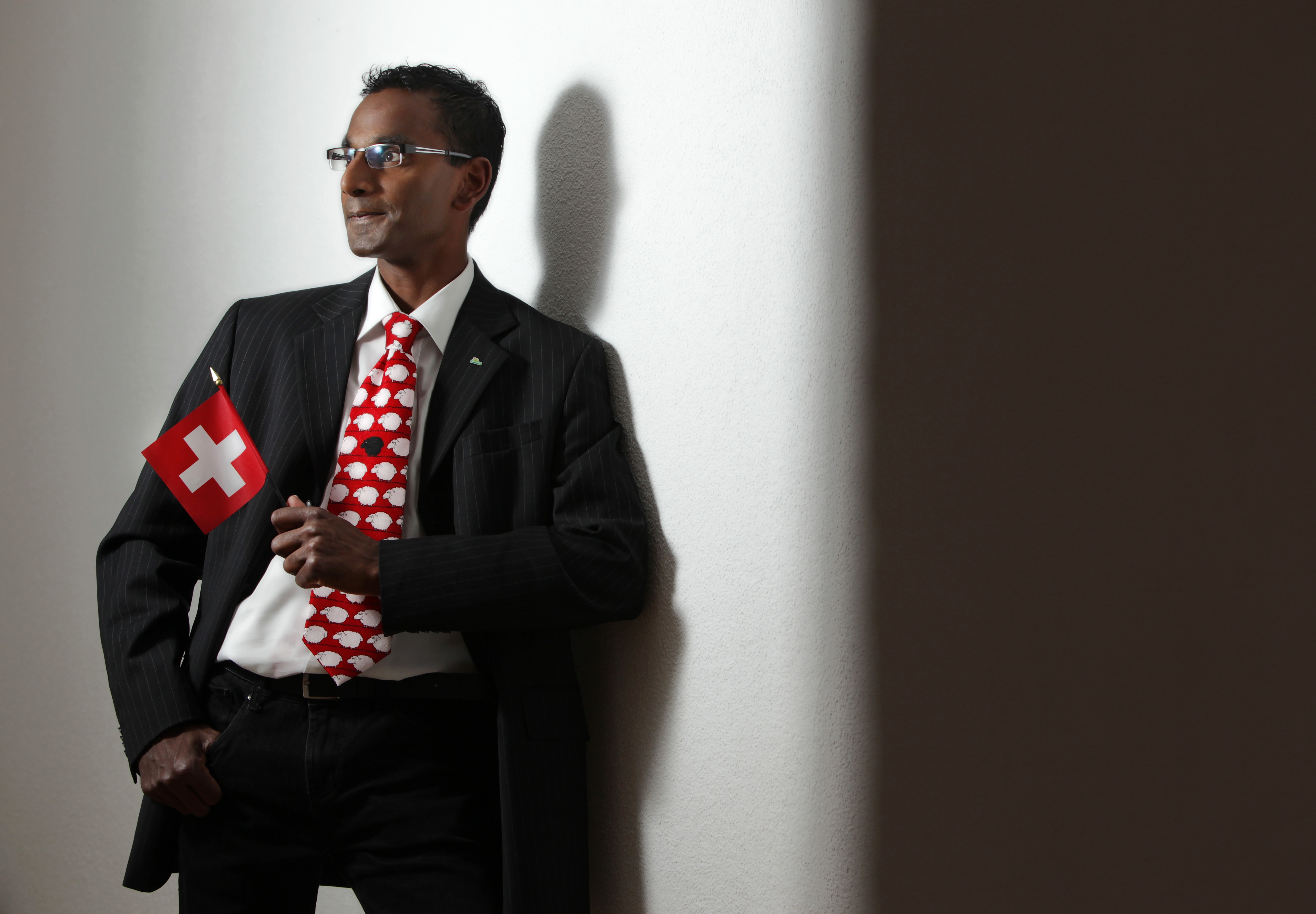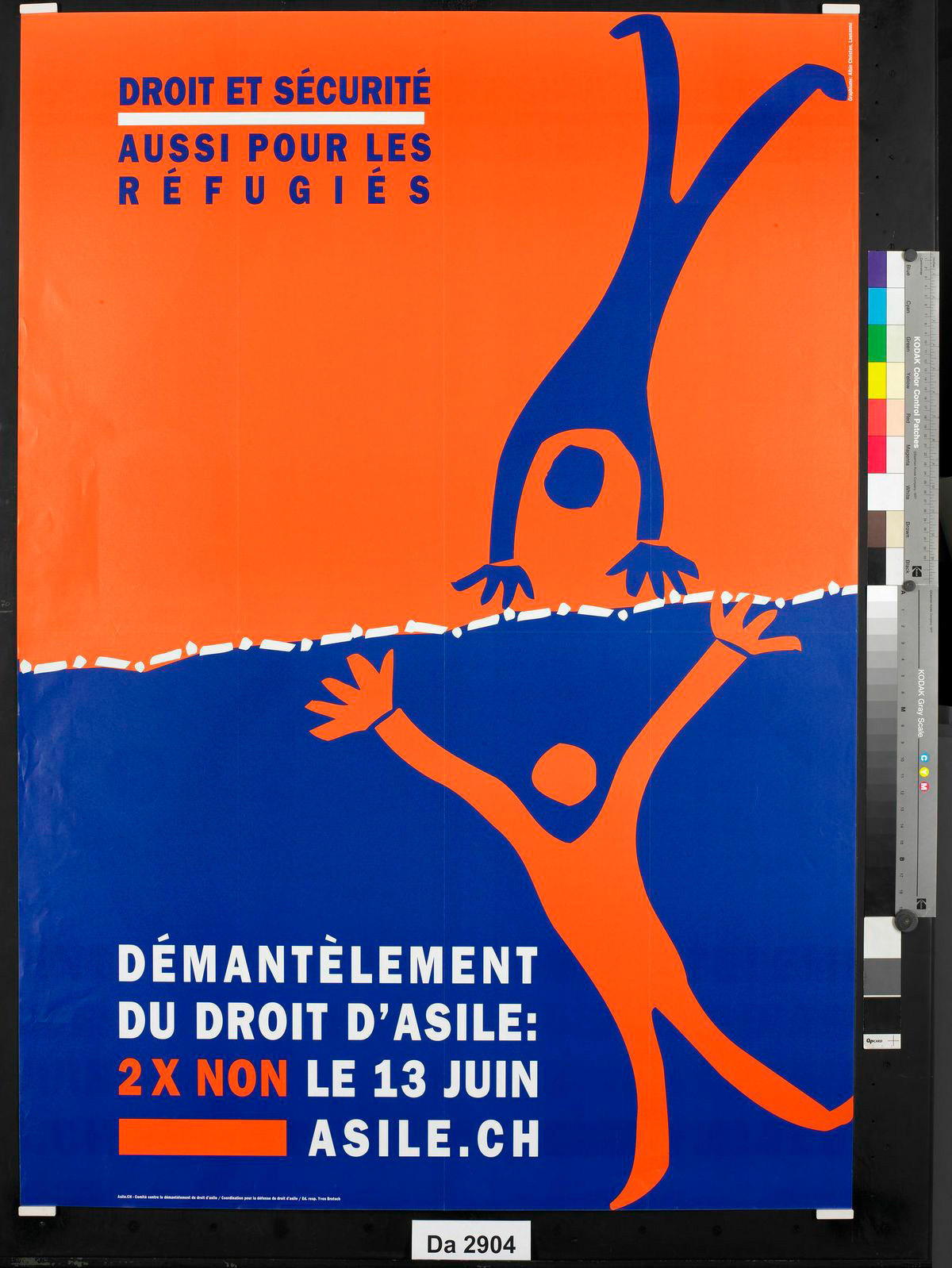What attracts immigrants to rightwing politics?

The term ‘direct democracy’ takes on new meaning when you become a Swiss citizen. One choice is which party to support. Can the rightwing Swiss People’s Party, behind various anti-immigrant initiatives, appeal to a naturalised immigrant?
It’s the first week of the Spring parliament session. The door to the chambers of the House of Representatives swings open, and Toni Brunner, the People’s Party president, strides over to shake my hand.
The People’s Party, which was the driving force behind initiatives to expel foreign criminals, ban minarets and most recently to cut back on immigration, has a reputation for being anti-foreigner. Does it deserve it?
“No, not at all!” Brunner tells me. He leans forward, his expression earnest. Foreigners are “very welcome!” in the party, he says. Party membership offers immigrants an opportunity to “get a feel for and help shape democracy”.
The party has a lot of support from foreigners in Switzerland, says Brunner – in particular from young second-generation foreigners. Although there are no national statistics at the party’s headquarters, Brunner says: “I know that’s true because I go to a lot of party foundings.”
Many immigrants appreciate the party’s commitment to autonomy, says Brunner. “We want to make decisions about the future – our future – and we believe the people should have the last word.”
Appealing to immigrants
One immigrant who supports the People’s Party is parliamentarian Yvette Estermann. She grew up under a totalitarian regime in the former Czechoslovakia and came to Switzerland in 1993.
In her native country there were few opportunities to influence the course of events, she says. The biggest difference between the two countries lies in “the freedom, the rights that we have in a democracy, and also the power that people have through the right to vote”.
Estermann heads the political group Neue Heimat Schweiz (New Home Switzerland), established in 2010 to reach out to foreigners – both Swiss and non-Swiss – who want to show their commitment to Switzerland.
Although the group is referred to as non-partisan and there are few references to the People’s Party on its website, the values reflect the party line. Around 140 people attended the group’s first symposium in June 2011, which featured rightwing newspaper editor Roger Köppel speaking on the topic “Immigration yes, but with limits”.
Support from foreigners
After the latest national vote last month, immigrating to Switzerland is likely to become more difficult. On February 9, 50.3% of Swiss voters and a majority of cantons passed the People’s Party’s initiative to limit immigration, which calls for the introduction of quotas for foreigners working and living in Switzerland, a preference for Swiss citizens when filling job vacancies, and restrictions on immigrants’ rights to social benefits.
Why would a foreigner in Switzerland support such an initiative, or the party behind it?
Political scientist Gianni D’Amato of the University of Neuchatel says this could be because of a need to feel “recognised and accepted”.
According to D’Amato, the People’s Party offers “a strong picture” of what it means to be Swiss. “But it’s also an old-fashioned image. Basically, it’s the Switzerland of the 50s and 60s, when everything was okay and in order.”
The People’s Party needs immigrants as members, he says. “If foreigners are part of it, this would be the legitimation that their politics is not addressed to any form of discriminatory behaviour.”
Provoking change
A new development on the political landscape is that immigrants are building up subgroups in the parties, says D’Amato. “And it’s now sort of common sense, also for the Radicals and the Christian Democrats, to have people on their lists who have a marked immigration background.”
Dual Croatian-Swiss national Niko Trlin helped found Neue Heimat Zug, the first cantonal branch of the Neue Heimat Schweiz group. For him, it’s about putting the focus on well-integrated foreigners who contribute to the “Swiss success model” and countering negative examples from the media and politicians.
He supports the People’s Party because he feels it’s one of the few parties working to preserve Swiss values. “I wanted to do my part so that we can keep the privileged life we enjoy here in Switzerland.”
But he says he can see why some people might be surprised at this due to his Croatian background.
“I can see that, but from my perspective, if I want to change things concerning foreigners it’s no good yelling across the river from the other side – I have to be in the middle of the action.”
He does admit to finding the People’s Party’s recent campaigns “a bit over the top” and feels they don’t reflect the situation of most foreigners who live here. “The picture portrayed is of failed migrants or bad examples of integration and thus throws a bad light on all foreigners, 95% of whom do excellent work in Switzerland.”
The direction
Yvette Estermann has served in the House of Representatives since 2007 and is among the few naturalised Swiss in Parliament at present. She received Swiss citizenship in 1999 and joined the People’s Party in Kriens, canton Lucerne, in 2000.
Deciding which party to join wasn’t difficult, Estermann says. In watching the political debates on television she was impressed by the party figurehead Christoph Blocher. “I thought, he makes such clear statements. He’s genuine.” She began studying the party’s platforms and “that confirmed for me that this was the right direction”.
The party’s programme for 2011-2015 is outlined in a slick 100-plus-page document filled with statistics, quotations and glossy photos of Switzerland. The party’s values are described in detail. “When people vote for the [Swiss People’s Party], we want them to know exactly what they will get,” says the introductory text. “The [Swiss People’s Party] speaks with a clear voice and steers a clear and reliable course.”
Some of those values – like sovereignty, direct democracy and personal responsibility – are supported by most Swiss political parties. Others – like rejection of EU membership and cutting down on crime by deporting foreign criminals – are not.
On closer reading, many of the party’s references to foreigners seem negative. Citizenship “is being distributed like confetti”. And “[a]lthough there are no comprehensive federal statistics on youth crime, and many young lawbreakers now have Swiss passports, experts estimate that 75 percent of juvenile criminals have an immigrant background.”
So, are there “good foreigners” and “bad foreigners”?
No, says party president Toni Brunner, but “like everywhere, there are good and bad people. . . both among foreigners and Swiss. And those are the criminals, the people who don’t obey laws and place their own culture above the laws of the country.” Everyone who lives here is expected to respect the Swiss Constitution, says Brunner.
More Swiss than the Swiss
Standing up for Swiss culture is no problem for Yvette Estermann. In 2008 she introduced a motion in parliament which would have required parliamentarians to sing the national hymn before each new session began. “Many people said, ‘You, of all people!’” she remembers, laughing. “But many were appreciative, and said, ‘You’re teaching us Swiss how to be Swiss.’”
Regardless of which party they support, naturalised foreigners – like all Swiss citizens – have a say in the future of their country.
On hearing that I’ve recently become Swiss, Toni Brunner beams and shakes my hand again. “Congratulations! Welcome!”
“It shouldn’t be easy to become Swiss,” he says, “but when you do, it’s a privilege. Citizenship means being able to contribute to decisions, and the fight for this right is worth it, even if it takes five or ten years.”

In compliance with the JTI standards
More: SWI swissinfo.ch certified by the Journalism Trust Initiative










You can find an overview of ongoing debates with our journalists here . Please join us!
If you want to start a conversation about a topic raised in this article or want to report factual errors, email us at english@swissinfo.ch.